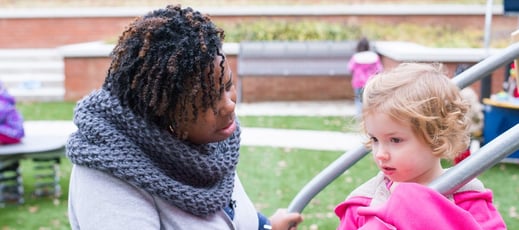
I was quite taken aback recently when an intern completing her first semester with a group of young toddlers told me, “My goal when I started the semester was to use more self-talk and parallel talk, but the toddlers are now talking, so that’s no longer needed.”
How to respond? Clearly she assumed that the self- and parallel talk supported language for very young children, and the effectiveness ended there. But that's not really true.
Once children have learned a few words, they aren’t yet masters of all the nuances of language. Using self- and parallel talk can help children build language skills beyond learning first words. How else would children first learn about complex sentences and verb tenses without someone to model it for them?
Going deeper, when you use self-talk to describe your reasoning, children build metacognition skills (under the Concept Development dimension). For example, you can describe why you use more blocks on the bottom of a tower as you build blocks with children. "Now I'm adding more blocks to the bottom of tower. I think this will keep the blocks at the top from falling!" Not only are you modeling language skills, but you're also explaining your thought process behind your actions.
In my conversation with the intern, I explained that the CLASS tool is looking for self- and parallel talk into the elementary grades. We talked about how language development is built by adults modeling the skills one step more advanced than that of the child’s. While the toddlers she was working with were able to use simple sentences, they still have much to learn in terms of vocabulary, non-contextual speech, and verb tenses.
Have you ever had to explain the need for self- and parellel talk? What other scenarios can you think of where self- or parallel talk can help children in mulitple ways? Share your feedback in the comments below!
Mary Lu Love directs several grant-funded programs through the Institute for Community Inclusion at UMass Boston, teaches early childhood courses at UMass Boston, and works on a number of early childhood collaborations. She has 40+ years of experience teaching and administering in early childhood programs. She has taught in higher education part-time for 20+ years, and helped to develop the early childhood undergraduate degree program at the University of Massachusetts Boston. She is also a long-standing member of the National Association for the Education of Young Children.
Editor's Note: This post was originally published May 2015, but has since been updated to include new content.

